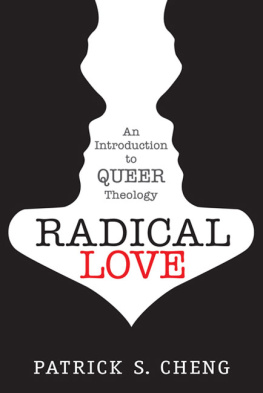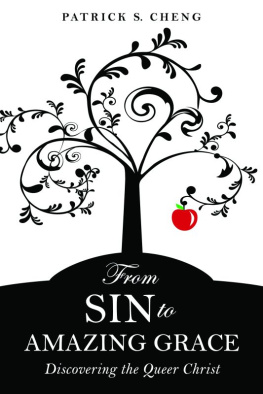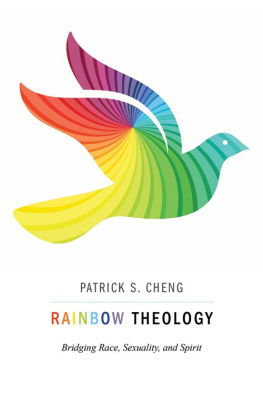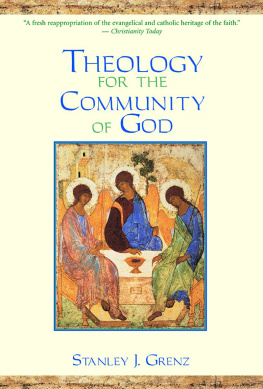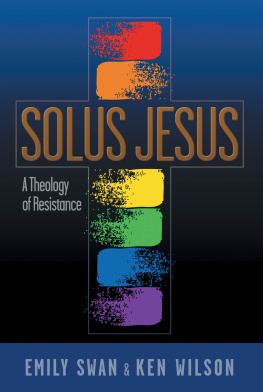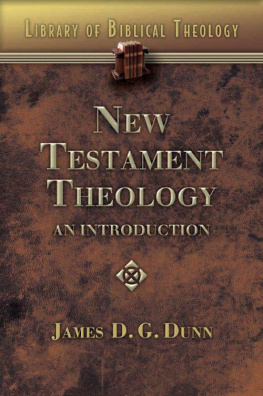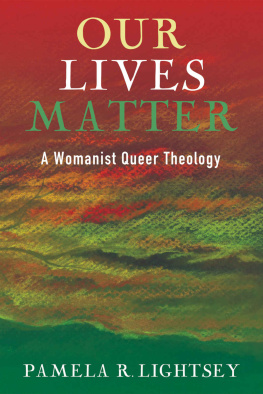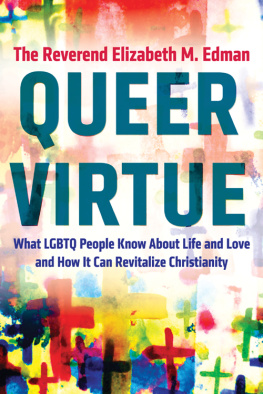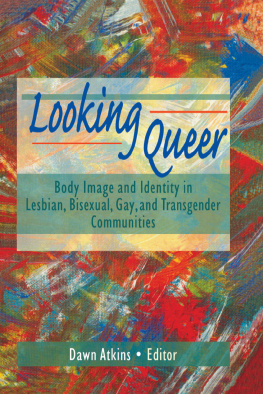Patrick S. Cheng is the Assistant Professor of Historical and Systematic Theology at Episcopal Divinity School in Cambridge, Massachusetts. He holds a Ph.D., M.Phil., and M.A. from Union Theological Seminary in New York, a J.D. from Harvard Law School, and a B.A. from Yale College. Patrick is a contributor to the religion section of the Huffington Post and is an ordained minister with the Metropolitan Community Churches. His writings have appeared in a number of publications, including the second edition of Sexuality and the Sacred (WJK) and The Queer Bible Commentary (SCM). For more information about Patrick, see his website at http://www.patrickcheng.net.
This book could not have been written without the help and encouragement of many people. I would like to thank my doctoral adviser and mentor, James H. Cone, who believed in me and helped me find my theological voice. I would also like to thank my other theological mentors over the last decade: Kwok Pui-lan, Mark D. Jordan, and Christopher L. Morse.
I would like to thank all members of the Episcopal Divinity School community for their support, especially my faculty colleagues. It is difficult to imagine a more talented and passionate group of scholars-pastors-activists than Angela Bauer-Levesque, Clarence Butler, Christopher Duraisingh, Bill Kondrath, Kwok Pui-lan, Julie Lytle, Joan Martin, Katherine Hancock Ragsdale, Ed Rodman, Susie Snyder, Fredrica Harris Thompsett, Larry Wills, and Gale Yee. I am also grateful for Aura Fluett, our wonderful reference librarian.
I am grateful for my past andin some instancespresent colleagues and friends at Union Theological Seminary in New York City, the Church Pension Group, the Metropolitan Community Churches, the American Academy of Religion (in particular, the Asian North American Religions, Cultures, and Society Group and the Gay Men and Religion Group), Christ Church Cambridge, the Gay Asian and Pacific Islander Men of New York (GAPIMNY), Queer Asian Spirit, and Easton Mountain Retreat Center, many of whom are cited in this book.
I am grateful for the participants in the 2010 Emory University Summer Seminar on Religion and Sexuality, the participants in the 2010 Human Rights Campaign Summer Institute, and my colleagues in the Emerging Queer API Religion Scholars (EQARS) group.
I am grateful for my theological family and other conversation partners, colleagues, and friends over the years, including Byron Au Yong, Roy Birchard, Pat Bumgardner, Mike Campos, Faith Cantor, George Chien, Arnie Chin, Susie Chin, Conrad Chu, Hugo Crdova Quero, Ned Coughlin, Thomas Eoyang, Diane Fisher, Vicky Furio, K. David Harrison, Sharon Hwang Colligan, Barton T. Jones, Michael Kelly, Jonipher Kwong, Wendell Laurent, Debbie Lee, Elizabeth Leung, Benny Liew, Leng Lim, Sister Linda Julian, Mary McKinney, Jay Michaelson, Kyle Miura, Tim Nevits, Hung Nguyen, Su Pak, Christine Pao, Pauline Park, Sung Park, Ed Paul, Paul Raushenbush, Joe Robinson, Michael Shernoff, David Siegenthaler, Miak Siew, Scot Simon, John Stasio, Pressley Sutherland, Dave Swinarski, Jonathan Tan, Josh Thomas, Weiben Wang, and Lai Shan Yip. There are many, many othersthe names of whom would fill many books in the worldand I am thankful for all of them.
I have appreciated the thoughtful comments of my editor at Seabury Books, Davis Perkins, and those of my friends and colleagues Rich McCarty, Catherine Owens, Bob Shore-Goss, Sue Spilecki, and Linn Tonstad who graciously agreed to review the manuscript. Of course, all errors and omissions in the manuscript remain my sole responsibility.
I am grateful to my network of family and friends in both cyberspace (for example, on Facebook) and the real world, including my mom, Deanna Cheng; my brother, Andrew Cheng; and his family, Abi Karlin-Resnick, Jordan Cheng, and Noah Cheng. I give thanks for the life of my late father, Richard H.Y. Cheng. Most of all, I am grateful to my husband, Michael Boothroyd, who has been radical love incarnate for me over the last two decades, and our dog, Chartres, who has brought much joy into our lives.
December 1, 2010World AIDS DayCambridge, Massachusetts
ADVANCE PRAISE forRadical Love
Patrick Chengs Radical Love is an excellent introduction to queer theology. It is readable and nuanced, a marvelous teaching resource.
- Carter Heyward, author of Keep Your Courage: A Radical Christian Feminist Speaks and Professor Emertia of Theology, Episcopal Divinity School
Thoroughly Christian and thoroughly Queer, Cheng helps readers welcome a theology that leaves no one behind.
- Chris Glaser, author of As My Own Soul: The Blessing of Same-Gender Marriage and Coming Out as Sacrament
Patrick Chengs Radical Love is not only an excellent introduction to LGBT theology but an important contribution to the discipline of theology and the life of the church. It is a must read for anyone who cares about the health of the church and theology today.
- James H. Cone, Charles Augustus Briggs Distinguished Professor of Systematic Theology, Union Theological Seminary, New York, NY
This book is a clear, accessible and exciting analysis of Queer Theology. Cheng perfectly captures both the challenge and the rootedness of Queer Theology.
- Professor Elizabeth Stuart, Pro Vice-Chancellor, University of Winchester, UK
I would characterize Chengs notion of radical love as wild grace with which mainstream theology has yet to wrestle. This is a good text for introducing queer theology to undergraduate and graduate students.
- Rev. Dr. Bob Shore-Goss, Senior Pastor/Theologian, Metropolitan Community Church in the Valley, North Hollywood, CA
Radical Love - a love so extreme that it dissolves our existing boundaries! What concept could be more liberating for a culture like ours, where lives are crucified on rigid binaries like male, vs. female, us vs. them, straight vs. queer? Radical Love is an excellent introduction for beginners and an excellent synthesis for more advanced readers.
- Virginia Ramey Mollenkott, author of Sensuous Spirituality and Omnigender, among many other books.
Adams, Elizabeth. Going to Heaven: The Life and Election of Bishop Gene Robinson. Brooklyn, NY: Soft Skull Press, 2006.
Alison, James. Broken Hearts and New Creations: Intimations of a Great Reversal. London: Continuum, 2010.
____________. Faith Beyond Resentment: Fragments Catholic and Gay. New York: Crossroad Publishing, 2001.
____________. The Gay Thing: Following the Still Small Voice. In Loughlin, Queer Theology, 5062.
____________. The Joy of Being Wrong: Original Sin Through Easter Eyes. New York: Crossroad Publishing, 1998.
____________. On Being Liked. New York: Crossroad Publishing, 2003.
____________. The Place of Shame and the Giving of the Spirit. In Alison, Undergoing God, 199219.
____________. Undergoing God: Dispatches from the Scene of a Break-In. New York: Continuum, 2006.
____________.Alpert, Rebecca. Like Bread on the Seder Plate: Jewish Lesbians and the Transformation of Tradition. New York: Columbia University Press, 1997.
____________. Althaus-Reid, Marcella. From Feminist Theology to Indecent Theology. London: SCM Press, 2004.
____________. Indecent Theology: Theological Perversions in Sex, Gender and Politics. London: Routledge, 2000.
____________, ed. Liberation Theology and Sexuality. Aldershot, UK: Ashgate, 2006.
____________. The Queer God. London: Routledge, 2003.
Althaus-Reid, Marcella, and Lisa Isherwood, eds. Controversies in Body Theology. London: SCM Press, 2008.
____________, eds.

